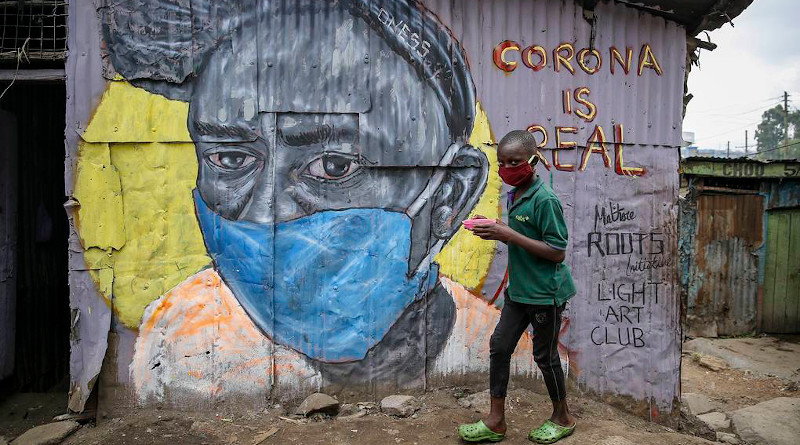COVID-19 To Push More Than 34 Million People Into Extreme Poverty In 2020 – OpEd
By IDN
By Santo D. Banerjee
The COVID-19 pandemic is threatening to deal a huge blow to global efforts for eradicating extreme poverty and hunger, two of the vital goals of the 17 SDGs. A new UN report expects more than 34 million people to fall below the extreme poverty line in 2020. 56 percent of them will be in African countries. An additional 130 million people may join the ranks of people living in extreme poverty by 2030.
But the United Nations World Economic Situation and Prospects (WESP) mid-2020 report underscores a window of opportunity for “recovering better” in the post-COVID-19 period, with renewed global solidarity enhancing public health systems, building resilience to withstand economic shocks, improving social protection systems worldwide, greening of economies and addressing climate change.
The report also highlights an interesting aspect of impact: the pandemic could foster a new normal, fundamentally reshaping human interactions, inter-dependence, trade and globalization, while accelerating digitalization and automation. On the other hand, a rapid surge in economic activities online will likely eliminate many existing jobs, while creating new jobs in the digital economy. The net wage and employment effects could be negative, further aggravating income inequality.
The pandemic, which is disproportionately hurting low-skilled, low-wage jobs, while leaving higher-skilled jobs less affected – will further widen income inequality within and between countries.
Against the backdrop of a devastating pandemic, the report expects the global economy to contract sharply by 3.2 per cent this year resulting in a loss of nearly $8.5 trillion in output over the next two years due to the COVID-19 pandemic. This would wipe out nearly all gains of the previous four years.
The shrinking economy, which marks the sharpest contraction since the Great Depression in the 1930s, comes on top of anaemic economic forecasts of only 2.1 percent at the start of the year.
The UN report estimates that GDP growth in developed economies will plummet to -5.0% in 2020. It expects a modest, 3.4% growth – barely enough to make up for the lost output – in 2021. World trade is forecast to contract by nearly 15 per cent in 2020 amid sharply reduced global demand and disruptions in global supply chains.
“Nearly 90 per cent of the world economy has been under some form of lockdown, disrupting supply chains, depressing consumer demand and putting millions out of work. Under the baseline scenario, the developed economies are expected to contract by 5.0 per cent in 2020, while the output of developing countries will shrink by 0.7 per cent,” says the report.
Facing an unprecedented health, social and economic crisis, governments across the world have rolled out large fiscal stimulus measures – equivalent to an estimated 10 per cent of GDP – to combat the pandemic and minimize its livelihood impacts. However, the depth and severity of the crisis foreshadows a slow and painful recovery, adds the report.
Elliott Harris, UN Chief Economist and Assistant Secretary-General for Economic Development says: “The pace and strength of the recovery from the crisis not only hinges on the efficacy of public health measures in slowing the spread of the virus, but also on the ability of countries to protect jobs and incomes, particularly of the most vulnerable members of our societies.”
The report emphases that many developing countries face severe fiscal constraints. Most are saddled with chronic fiscal deficits and already high levels of public debt. They are finding it very hard to implement sufficiently large fiscal packages, which have thus far averaged less than 1% of their GDP.
Besides, falling exports and growth are rapidly undermining the debt sustainability of many developing countries, particularly those that are heavily dependent on commodities, tourism revenues or remittances. Growing debt distress poses an enormous challenge to these countries, further constraining their ability to implement much-needed stimulus measures.
The report accentuates the need of large fiscal and monetary stimulus measures – with trillions of dollars of new liquidity injected into the financial system – boosting productive investments contributing to the quick recovery of equity and bond prices, while ignoring productive investments. The report recalls that while global liquidity per capita surged since the Global Financial Crisis in 2008, while productive investment per capita stagnated.
Hamid Rashid, Chief of the Global Economic Monitoring Branch and lead author of the report, says “The lesson we learnt from the last crisis is that fiscal and monetary stimulus measures do not necessarily boost productive investments. Governments must encourage businesses receiving its financial assistance to invest in productive capacities. This is a must for protecting decent jobs and preventing further rise in income inequality.”
The UN report calls for stronger global cooperation stressing that it is critical, especially to contain the pandemic and extend financial assistance to countries hardest hit by the crisis. In the immediate term, the increased availability and rapid deployment of international funds to address liquidity shortages and free up fiscal space is paramount.
In addition to these short-term measures, says the report, many developing countries – particularly commodity – and tourism- dependent economies – will still need comprehensive debt restructuring to have the fiscal space to stimulate growth and accelerate recovery.

